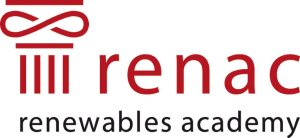RENAC – Capacity building on PV-diesel-hybrid mini-grids (Kenya)
Who, What & Where
- Renewables Academy AG (RENAC)
- Capacity building on PV-diesel-hybrid mini-grids
- Kenya
- Completed in 2013
The Organisation
The Renewables Academy AG (RENAC) is a leading international provider of training and capacity building in renewable energy and energy efficiency. Since 2008, about 6,500 participants from 145 countries have attended RENAC programmes.
The Challenge
In 2013, Kenya had an electrification rate of only 5% in rural areas. In these regions, electricity is often supplied by means of diesel generator powered mini-grids. The limited supply of spare parts, non-transparent transportation of diesel fuel, its storage in remote areas and, of course, the ever-increasing price are severe risks for a secure and reliable electricity supply in rural areas. Moreover, carbon emissions, leakages, noise and air pollution from diesel generators pose substantial threats to people, animals and the environment.
Opportunities for Renewables
In order to avoid the high costs of diesel in remote areas, the Government of Kenya (GoK) decided to look for alternative energy solutions. As a result, renewable energy was included in the plan to provide areas far from the national grid with electricity. As part of its first stage, several pilot projects were installed with GoK’s funds. The state utility Kenya Power & Lighting Company (Kenya Power) and the Rural Electrification Authority (REA) undertook the design of the systems. Capacity building was necessary to scale up the electrification programme.
Renewable Solution
In November 2013, RENAC provided Kenya Power and REA with a 3-day training in Nairobi. The objective was to learn how to optimally design tenders that incorporate solar PV in diesel mini-grids and raise awareness on state-of-the-art technology solutions for these systems. Among the most important topics covered during the training were:
• assessment of existing PV-diesel-hybrid systems in Kenya;
• energy audits and load profile recording;
• system engineering, components, design, energy yield calculation;
• working with software design tools;
• operation and maintenance;
• Kenyan Rural Electrification policy and
• tendering.
Project Financing and Costs
The training was provided within the framework of the Project Development Program (PDP) Sub-Saharan Africa by the Deutsche Gesellschaft für Internationale Zusammenarbeit (GIZ) GmbH with the support of the Renewable Energies Export Initiative (EEE) of the German Federal Ministry of Economics and Technology
Project Outcome
Representatives from Kenya Power, Strathmore Business School, GIZ, the United Nations Industrial Development Programme (UNIDO), the Department of Energy and the Rural Electrification Authority (REA) attended the workshop. The discussions during the event confirmed the great interest in PV-diesel hybridisation. Based on the knowledge gained, participants developed a good understanding of the technologies and its potential. The project established a solid knowledge base for the authorities to save costs and to secure and expand rural electrification throughout Kenya making it a best-practice for other countries to follow.

